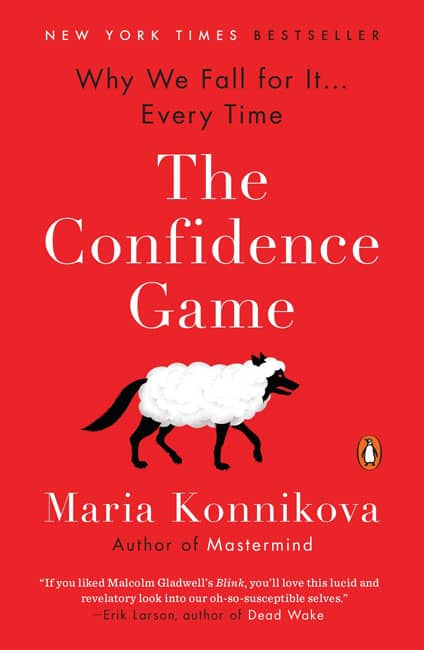SUBJECT: 3.5/5
RELEVANCE: 4.5/5
WRITING STYLE: 4/5
ENTERTAINMENT QUOTIENT: 4.5/5
My Musings
When I discovered this book in the non-fiction section of Amazon, I was immediately interested in reading it for its fascinating subject matter.
This book is a non-fiction psychology book written by an American-Russian Psychologist. It aims to tackle baffling questions around the art of the confidence game, the chief of them being why do we get manipulated so easily and repeatedly?
Read on to know more about my thoughts on this book.
What is the book all about and what to expect?
The Confidence Game: Why We Fall for It . . . Every Time by Maria Konnikova is a book primarily written about human psychology, blended with engaging and intriguing real-life stories of confidence tricksters and scam artists.
Some might say that non-fiction books are challenging to read, but this book is a spectacular example of a nonfiction work that is just as entertaining as a fictional one.
The readers can expect a wide array of short tales of individuals who have worked the confidence game, combined with impressive analysis, simple explanations and extensive scientific research.
The book is well-structured, walking the readers through different chapters that dive more in detail about the ways in which confidence tricksters have manipulated their subjects.
The focus of the book, however, is not in the salacious details of these acts but the ways in which we can become manipulated and what to do when we are.
Apart from the psychological elements featured in the book, Konnikova also explores her topics from sociological and dramatic perspectives.
After reading this book, readers will be much more informed about their own unconscious tendencies and be able to guard themselves against future manipulation attempts.
What about the writing style?
The writing style is easily one of the best things about the book. The source material of the book, which includes various case studies, interviews, and news reports, is masterfully rearranged into captivating tales.
The author impeccably weaves the analysis among the tales, which ensures a seamless reading experience.
The terminology used throughout the book is also easy to understand. The work belongs to a booming new genre of social psychology books designed for mass consumption, which essentially means the books are both informative and entertaining.
The author does a fabulous job of disguising an academic book as an entertaining storybook.
The research and experience
The Confidence Game is very well researched. The author holds a doctorate in Psychology from an elite Ivy League North American college. Not only does she include her own insights, but she also cites from various sources working within the fields of both psychology and sociology.
The credibility of the book can further be attested to the fact that this book’s material served as the basis of the author’s recent talk at the 2019 World Economic Forum.
Is it an entertaining read?
If you are fascinated by the ways in which people manipulate and trick each other, this book is extremely entertaining to read. The stories included in this book go as far back as the late 1800s, right up to present day scammers.
Additionally, the book talks about confidence tricksters from all spheres of life, whether it be computer hackers and digital scammers, Ponzi schemers, poets, gurus or magicians.
But most importantly, the psychological analysis throughout makes it not only a refreshing read but also an unputdownable book.
The Confidence Game is filled with interesting anecdotes that give important insights into human nature.
The book will make you ponder over your own actions and experiences. The reader will be surprised at their own reactions and moments of mistrust, which makes the book such an interesting read.
This book will definitely get one’s mind jogging and more aware of one’s surroundings.
Pick up the book
- If you’re looking for a book on how the confidence game works.
- If you’re looking for a fun non-fictional book to read.
- If you want to read about human psychology.
Skip the book
- If you are not interested in the art of the con.
- If you absolutely cannot stand nonfiction.
- If you do not enjoy psychology books.
Can’t wait to read it? Buy your copy of The Confidence Game: Why We Fall for It . . . Every Time using the link below.
